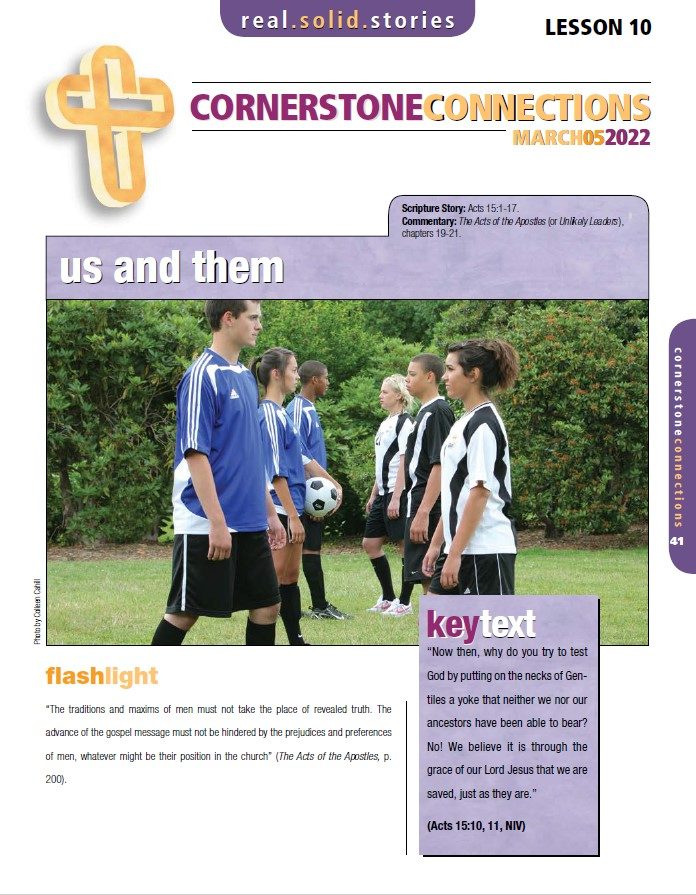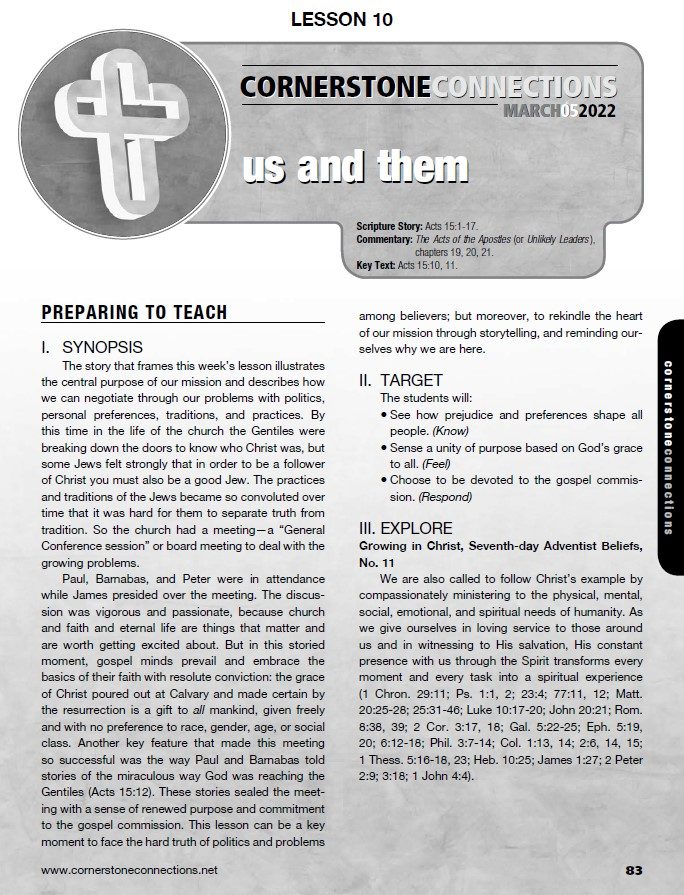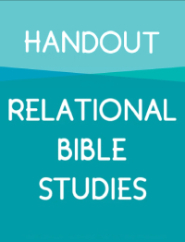“Us and Them”
Click below to download the Cornerstone Connections leader’s guide and student lesson. This week’s resources also include two lesson plans and a discussion starter video which offer different ways of looking at the topic. Each lesson plan includes opening activities, scripture passages, discussion questions, and real-life applications.
Tensions arose between the Gentile and Jewish believers. But through sharing stories of how God was working among them, they rekindled the heart of their mission to the world.
Scripture Passage
Acts 15:1-18
OVERVIEW
This lesson is going to talk about the challenges of “new” discoveries about God, and what we do in light of those revelations.

OPENING ACTIVITY
You have two opening activities to choose between this week. The first game (First to Five) is the safe version, the second is a little more risky. Please choose the one that will fit your church and youth group the best. The story in the lesson today is about disagreements in the church, but it is also about finding healthy resolution and moving forward in grace. Please keep that in mind if you choose the second game—it is meant to spur discussion, not separate people.
Activity 1: First to Five (Spring Break Version)
For this game all you have to do is put a finger up if the statement is true for you. The first person with five fingers raised is the winner of that round.
(Next Level Leader Tip: If an answer is surprising feel free to pause the game and get the story behind student’s answer!)
(This should be enough statements; feel free to come up with some others if it’s not!)
QUESTIONS
Activity 2: Agree or Disagree
Designate one side of your meeting space as the “agree” side, and the opposite side as the “disagree” side. Have your group move to the appropriate side based on their responses to the following statements. Make sure that you have each side present why they chose the side they are on, but also make sure they are always respectful of the other side
. Also discourage sitting in the middle even though sometimes that may be the “right” answer. Leaders, also feel free to add some statements, but please make sure that one or two students are not always on one side of the room and feel singled out. If you know this will be the case with your group, maybe Activity 1 is better for you.
QUESTIONS
Those last two questions were extra weird. But those were the questions that caused some of the first divisions in the 1st century church!
TRANSITION
It is fun to learn more about each other. Honestly, that is one of the great things about good games. Good games and activities draw us together into a deeper understanding of each other! As Christians, and Adventist Christians as well, it is important for us to realize that each of us brings a different history to the table. More importantly, “His”tory (by His I mean God if you didn’t get that) is tailored to each of us even though God is unchanging! The Bible text for today is a great example of how the early Acts church struggled with that concept. Different groups with different ideas about how people could best live out being a disciple of Jesus fought for their idea to be right, and it almost split the movement of Jesus before it had even begun! Church politics goes back a long way!

BIBLE STUDY GUIDE
The last few weeks of Sabbath School lessons have been about some of the unlikely leaders who came to lead the early Jesus movement that we now call “the church.” Peter, Paul, and Barnabas have all played major roles in shaping the new movement. People like Stephen and James have died because of their commitment to Jesus and His message. Still others have tried to shape the movement after their Jewish traditions. Paul’s missionary journeys have added another complication to the movement that started in Jerusalem.
QUESTIONS
Read Acts 15:1-5.
1Certain people came down from Judea to Antioch and were teaching the believers: “Unless you are circumcised, according to the custom taught by Moses, you cannot be saved.” 2 This brought Paul and Barnabas into sharp dispute and debate with them. So Paul and Barnabas were appointed, along with some other believers, to go up to Jerusalem to see the apostles and elders about this question. 3 The church sent them on their way, and as they traveled through Phoenicia and Samaria, they told how the Gentiles had been converted. This news made all the believers very glad. 4 When they came to Jerusalem, they were welcomed by the church and the apostles and elders, to whom they reported everything God had done through them.
5 Then some of the believers who belonged to the party of the Pharisees stood up and said, “The Gentiles must be circumcised and required to keep the law of Moses.”
QUESTIONS
This next section deals with some of the first really big doctrinal decisions of the church.
QUESTIONS
Let’s read this very important passage. Perhaps we can learn about how to deal with difficult issues in our churches today.
Read Acts 15:6-18.
6 The apostles and elders met to consider this question. 7 After much discussion, Peter got up and addressed them: “Brothers, you know that some time ago God made a choice among you that the Gentiles might hear from my lips the message of the gospel and believe. 8 God, who knows the heart, showed that he accepted them by giving the Holy Spirit to them, just as he did to us. 9 He did not discriminate between us and them, for he purified their hearts by faith. 10 Now then, why do you try to test God by putting on the necks of Gentiles a yoke that neither we nor our ancestors have been able to bear? 11 No! We believe it is through the grace of our Lord Jesus that we are saved, just as they are.”
12 The whole assembly became silent as they listened to Barnabas and Paul telling about the signs and wonders God had done among the Gentiles through them. 13 When they finished, James spoke up. “Brothers,” he said, “listen to me. 14 Simon has described to us how God first intervened to choose a people for his name from the Gentiles. 15 The words of the prophets are in agreement with this, as it is written:
16 “ ‘After this I will return and rebuild David’s fallen tent. Its ruins I will rebuild, and I will restore it, 17 that the rest of mankind may seek the Lord, even all the Gentiles who bear my name, says the Lord, who does these things’ — 18things known from long ago.
QUESTIONS

APPLICATION
Most churches have a board meeting once a month. What if your youth group went to the board meeting and observed what happened?
Ask how your youth group might be involved in being a part of those decisions!

SCRIPTURE PASSAGE
LEADER’S NOTE
For a Relational Bible Study (RBS) you’ll want to get into the Scripture passage and encourage the youth to imagine participating in the story while it’s happening. Then you will be able to better apply it to your own situation today.
You will need to ask God for the Holy Spirit to be present as your small group discusses the questions (no more than 3-6 people in a group is recommended). Start with the opening question. It is a personal question and the answer is unique for each individual. There is no right answer and nobody is an expert here, so don’t be surprised when you hear different responses. You are depending on the Holy Spirit to be present and to speak through your group. Say what God prompts you to say, and listen to what others share.
Take turns reading the chapter out loud. Follow that with giving the students some time to individually mark their responses to the questions (a PDF version of the handout is available as a download). This gives each person a starting point for responding when you start to share as a group. Next, begin the discussion by asking the students to share what they marked and why on each question as you work your way through. Feel free to take more time on some questions than others as discussion warrants.
Encourage each person in the group to apply what is discussed to their personal lives and to share with the group what they believe God wants them to do. Then ask them to pray that God will help each of them to follow through in doing so. Remind them to expect that God will show them ways to live out the message of this passage in the coming week, and that they are free to ask others in the group to help hold them accountable.
OVERVIEW
In last week’s lesson, the wonderful and miraculous stories of spreading the Good News of Jesus yielded so many positive results. Gentiles, who had seemingly been outside of God’s plan or concern, were accepting Jesus as their Savior and Lord. The new group of “Jesus followers” seemed to be increasing exponentially!
If you were a Jew, would you rejoice about or reject this new wave that swept the fledgling Christian movement? Could a Gentile become a Christian, or did the Gentile first need to become a Jew (get circumcised) and then become a Christian?
New Christians who had been Jews considered circumcision normal and spiritual, since that had been their practice for centuries. Gentile Christians considered it Jewish, not Christian.
This week’s Bible study in Acts 15 describes how this disagreement came to a head, after Jewish Christians from Jerusalem went to the Christian Church in Gentile Antioch, and started to teach that Gentiles had to be circumcised before they could become followers of Jesus. It became such a divisive issue that the church leaders sent a group to Jerusalem—to “headquarters” where the church leaders of the new Christian Church resided.
While we may hope and pray there would never be conflict among Christians, it’s certain to happen, especially when something matters to people. Don’t be surprised that it happens; expect it to occur. Let’s look at Acts 15 to see how to respond to church conflicts rather than expect there will never be church conflicts.
Conflicts Among Christians
What’s an example of one of your church’s traditions?
Read Acts 15:1-17.
1 Certain people came down from Judea to Antioch and were teaching the believers: “Unless you are circumcised, according to the custom taught by Moses, you cannot be saved.” 2 This brought Paul and Barnabas into sharp dispute and debate with them. So Paul and Barnabas were appointed, along with some other believers, to go up to Jerusalem to see the apostles and elders about this question. 3 The church sent them on their way, and as they traveled through Phoenicia and Samaria, they told how the Gentiles had been converted. This news made all the believers very glad. 4 When they came to Jerusalem, they were welcomed by the church and the apostles and elders, to whom they reported everything God had done through them.
5 Then some of the believers who belonged to the party of the Pharisees stood up and said, “The Gentiles must be circumcised and required to keep the law of Moses.”
6 The apostles and elders met to consider this question. 7 After much discussion, Peter got up and addressed them: “Brothers, you know that some time ago God made a choice among you that the Gentiles might hear from my lips the message of the gospel and believe. 8 God, who knows the heart, showed that he accepted them by giving the Holy Spirit to them, just as he did to us. 9 He did not discriminate between us and them, for he purified their hearts by faith. 10 Now then, why do you try to test God by putting on the necks of Gentiles a yoke that neither we nor our ancestors have been able to bear? 11 No! We believe it is through the grace of our Lord Jesus that we are saved, just as they are.”
12 The whole assembly became silent as they listened to Barnabas and Paul telling about the signs and wonders God had done among the Gentiles through them. 13 When they finished, James spoke up. “Brothers,” he said, “listen to me. 14 Simon has described to us how God first intervened to choose a people for his name from the Gentiles. 15 The words of the prophets are in agreement with this, as it is written:
16 “ ‘After this I will return and rebuild David’s fallen tent. Its ruins I will rebuild, and I will restore it, 17 that the rest of mankind may seek the Lord, even all the Gentiles who bear my name, says the Lord, who does these things’ — 18things known from long ago.
1. Why was circumcision so important to the Jews?
2. Why did Antioch Church leaders react so strongly against circumcision?
3. Why did the Antioch Church send a group to Jerusalem?
4. How did the church leaders in Jerusalem decide this matter?
5. What was the “yoke” Gentiles and Jews couldn’t bear (vs. 10)?
6. What happened after the Jerusalem Council (see vs. 22-41)?
7. On the continuum below, place an “X” where you see yourself; put a “D” where you see your parents; and put a “Y” where you see your church.
Conservative Progressive
Keep things Change things
the same
8. How does your church deal with conflicts in beliefs or practices? How do you deal with them?
SUMMARY
The newer Christians in conflict reached out to older Christians who listened to them and considered the arguments and evidence. While they may have wished for a “Urim and Thummim” in order for God to communicate a divine answer, in this instance the leaders of God wrestled though God’s previous instructions and recent actions. Their decision had immediate ramifications, and the issue didn’t just go away. We’ll see the issue come up in future passages in Acts.

APPLICATION
Here are three application ideas for you to “live out” the Bible passage we studied for this week’s Youth Sabbath School.
Traditions cement people together as a group. Families have them; schools have them; churches have them; so do sports teams, clubs, and virtually any group of people. Sometimes people forget the reason behind their traditions, and sometimes traditions change. Young people are likely to challenge some of the traditions older people have in place. It might force all ages to re-think the reason and value of a given tradition. Our lesson study in Acts 15 showed the challenge of the tradition of circumcision. But there are many other you might find in your church.
DOWNLOAD “TRADITIONS—GOOD & BAD” PDF
This remains important in all human interactions. Remember, if something matters to somebody, they will be willing to fight about it. They won’t fight about things that don’t matter. Another way of saying this is, “People are willing to die for the same things they are willing to live for.” So, what are good ways to work out the differences when people, even Godly people, disagree?





